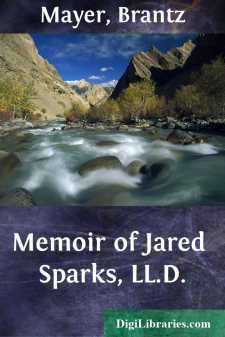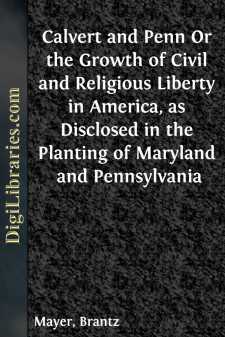Categories
- Antiques & Collectibles 13
- Architecture 36
- Art 48
- Bibles 22
- Biography & Autobiography 813
- Body, Mind & Spirit 142
- Business & Economics 28
- Children's Books 15
- Children's Fiction 12
- Computers 4
- Cooking 94
- Crafts & Hobbies 4
- Drama 346
- Education 46
- Family & Relationships 57
- Fiction 11828
- Games 19
- Gardening 17
- Health & Fitness 34
- History 1377
- House & Home 1
- Humor 147
- Juvenile Fiction 1873
- Juvenile Nonfiction 202
- Language Arts & Disciplines 88
- Law 16
- Literary Collections 686
- Literary Criticism 179
- Mathematics 13
- Medical 41
- Music 40
- Nature 179
- Non-Classifiable 1768
- Performing Arts 7
- Periodicals 1453
- Philosophy 64
- Photography 2
- Poetry 896
- Political Science 203
- Psychology 42
- Reference 154
- Religion 513
- Science 126
- Self-Help 84
- Social Science 81
- Sports & Recreation 34
- Study Aids 3
- Technology & Engineering 59
- Transportation 23
- Travel 463
- True Crime 29
Memoir of Jared Sparks, LL.D.
by: Brantz Mayer
Categories:
Description:
Excerpt
MEMOIR.
IT has been a sad but not entirely unpleasant duty to prepare, at the request of the Maryland Historical Society, a brief memoir of one of our earliest and most distinguished Honorary Members, the late Jared Sparks, LL.D. The duty, though sad, is not without a pleasant recompense, for the eulogium which a long-continued friendship and intercourse demand can be bestowed with cordial truth.
Mr. Sparks was what we call, in America, a self-made man. Although his life is a fair illustration of what an industrious person of talent and common sense may compass by decision of character and a high aim, my object in these observations is not to draw from his biography what has been aptly called "ostentatious precepts and impertinent lessons." By a self-made man I do not mean to class Mr. Sparks with that large and influential body of citizens whose portraits adorn the illustrated newspapers, and whose memoirs disclose the opinion that the making of a great deal of money is the making of a very exemplary man. When I speak of Mr. Sparks as a self-made man I use the phrase in a sense of intellectual progress and success, founded on self-relying discipline,—of mental culture and mental fruit, bringing him up to honorable fame from low obscurity,—making him a lasting power in our nation, nay, throughout the world, in our best society, in our literature, in our institutions of learning; and, finally, bestowing on him the just pecuniary rewards always due, yet seldom obtained in America, by intellectual pursuits alone.
Jared Sparks, the son of Joseph and Eleanor Orcutt Sparks, was born in Willington, Connecticut, on the 10th of May, 1789. The dawn of his life was overshadowed by poverty. I do not know the character or pursuits of his parents, but certainly they were very poor; nor have I found any record of their early care over the child, or, that his youth was comforted by the love and society of a brother or sister. The most reliable account I have received of his infancy shows that he went, with the childless sister of his mother, and her wayward husband, to Washington county, New York, and that the eager boy obtained the scant elements of education at the public schools of those days; working, at the same time, on a farm for his livelihood, and sometimes serving a dilapidated saw-mill, (his uncle's last resource,) whose slow movements afforded him broken hours to pour over a copy of Guthrie's Geography, which he always spoke of as a "real treasure."
Thus, there were no external influences to bring forth whatever powers were inborn in his character. Probably, it was in spite of those influences that he became a man of mark. His aunt, kind at all times, is chiefly remembered for her gentleness and beauty; his mother, for her devotion to reading, and mainly to the constant study of Josephus; while the grandmother of these ladies, Bethiah Parker, is mentioned as a singular enthusiast, who left to her posterity a manuscript volume of poems and letters peculiar only from the fact that, while they are vehicles of religious fervor, they are also autobiographical sketches, in which she discloses (in 1757) her prophetic visions of the "terrible times that are to come among the nations." There may have been some inheritance by the youth from his mother of a fondness for books, for he always spoke of her with great respect as a superior woman; but the probability is that the intellectual turn of his mind originated within itself, and was cherished by the affection he felt, and everywhere inspired as a boy, and the personal interest with which such a disposition is always repaid....




